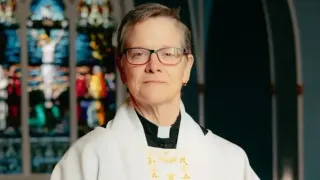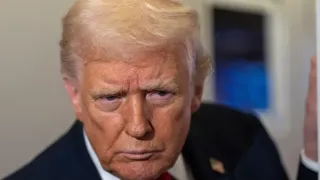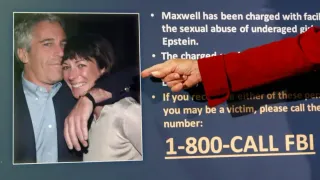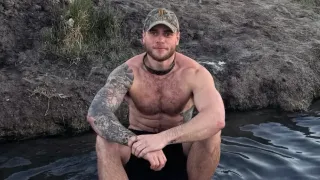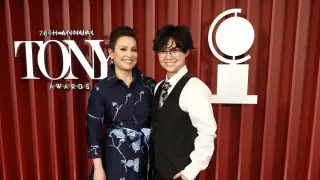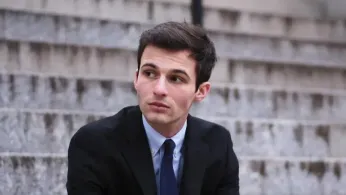
3 hours ago
Parkland Survivor Cameron Kasky Launches Progressive Congressional Campaign in Crowded New York Democratic Primary
READ TIME: 5 MIN.
Cameron Kasky entered the 2026 congressional race on Tuesday, November 18, 2025, announcing his candidacy through a video posted on social media that showcased him walking through New York City streets while discussing his vision for the country. The 25-year-old activist from Manhattan's Upper West Side is running to represent New York's 12th Congressional District, which encompasses much of central Manhattan including Chelsea, Greenwich Village, Midtown, Hell's Kitchen, and the Upper West Side.
Kasky's entry into the race reflects a broader trend of young, progressive candidates seeking to reshape the Democratic Party following recent electoral successes. In his announcement video, Kasky stated: "I'm Cameron Kasky, and I'm running for Congress because it feels like our party has no future, so we need to invest in a new generation of leaders to take on the fight. " He further emphasized his motivation, saying: "New Yorkers are always on the move, reaching new heights, and rushing towards the future, but today's leaders just can't keep up. "
Kasky's path to politics began with tragedy. On February 14, 2018, a gunman opened fire at Marjory Stoneman Douglas High School in Parkland, Florida, killing 17 people and injuring 17 others. Kasky, then a student at the school, survived the shooting and subsequently helped found March for Our Lives, a student-led organization dedicated to advocating for gun control legislation.
The activist has described his political awakening as stemming directly from his experience with gun violence. In his campaign announcement, Kasky recounted his journey into politics, stating that the mass shooting did not happen "in spite of the American system, it happened because of it. " He reflected on the impact of the March for Our Lives movement, saying: "But out of that tragedy, my classmates and I were able to get millions of people all across the country to take to the streets and call for real change. "
Kasky pointed to a specific moment in his activism as formative. Shortly after the Parkland shooting in 2018, he confronted then-Florida U. S. Senator Marco Rubio, now Secretary of State, asking if he would reject money from the National Rifle Association . Rubio ultimately did not commit to refusing NRA donations, an experience that Kasky has cited as evidence of systemic resistance to gun control measures.
After graduating from Parkland, Kasky enrolled at Columbia University in 2019, which brought him to New York City. He initially lived in Morningside Heights for two years before relocating to Chelsea. Currently, Kasky works as a contributor at The Bulwark news site, though he announced that his program would go on hiatus during his congressional run.
Kasky's campaign platform reflects progressive priorities that resonate with younger Democratic voters. His key policy positions include universal healthcare, abolishing Immigration and Customs Enforcement , and preventing gun violence. He has also called for Medicare for All and an end to what he characterizes as "funding genocide, "referring to U. S. military aid to Israel.
On the Israel-Gaza conflict, Kasky has taken a notably strong position. He stated that he would vote against continuing to send military aid to Israel in the wake of its war in Gaza, which was ignited by Hamas'October 7, 2023, terrorist attack on Israel that left more than 1, 200 dead and more than 250 people held hostage. This stance places him among the more vocal critics of U. S. military support for Israel within the Democratic primary field.
Kasky's broader economic message centers on the struggles of working Americans. In his campaign video, he emphasized: "You and your family are working all week just to spend most of your paycheck on rent and health care. Meanwhile, the richest people in our country are telling us that we can't afford solutions like social housing and Medicare for All. " This framing positions him as running for Congress "because there's no real path forward for most Americans. "
Kasky's entry into the race adds to an increasingly competitive Democratic primary for Nadler's seat. The 74-year-old representative of the 12th Congressional District announced he would not seek reelection, stating his desire to make way for fresh blood after 32 years in Congress.
The primary field now includes several prominent candidates. Jack Schlossberg, President John F. Kennedy's grandson, has attracted significant national attention with his own campaign to replace Nadler. Like Kasky, Schlossberg represents a new generation of progressive candidates vying for the seat.
The field also includes more established Democratic figures. Upper West Side Assembly Member Micah Lasher, 43, is running to "revitalize the Democratic Party, fight Trump's agenda, and deliver results that improve the lives of New Yorkers. " Upper East Side Assembly Member Alex Bores, in his mid-30s, is campaigning because "big systems have stopped working for the little guys — but together, we can fix them. " Chelsea and Hell's Kitchen City Council Member Erik Bottcher, 46, is running to "keep the New York City dream alive and take back our country. "
Additional candidates in the race include civil rights lawyer Laura Dunn, 40, who said she is "running fearlessly for the people, "and former journalist and political commentator Jami Floyd, 61, who has carved out a more moderate position in the primary. Merrill Lynch and Mercury Capital Advisors alum Alan Pardee, 58, is running to create "policies that make our city livable for all families, "and LGBTQ+ rights activist Matthew Shurka, 37, is campaigning to "take on corruption, confront Donald Trump's attacks on this city, and fight for the people who make New York home. "
Kasky's campaign announcement comes at a moment when progressive candidates are gaining momentum in Democratic politics. Progressives across the United States, particularly in New York City, are seeking to build on Democrats'recent electoral successes, including gubernatorial wins in New Jersey and Virginia.
The timing of Kasky's announcement also coincides with a broader conversation about the Democratic Party's direction. His campaign reflects a generational divide within the party, with younger activists and politicians seeking to push the party in a more progressive direction on issues ranging from healthcare to foreign policy. Like many of those already running for Nadler's seat, Kasky is positioning himself as part of a new generation of aspiring lawmakers seeking to take the Democratic Party in a different direction.
The style of Kasky's campaign announcement—featuring cinematic visuals and a jazzy musical ensemble—mirrors the aesthetic of other young progressive candidates'campaigns, including those of fellow New York City progressive leaders. This visual approach signals an attempt to connect with younger voters and differentiate from traditional political messaging.
As the 2026 election cycle unfolds, Kasky's campaign will compete for attention and support in an increasingly crowded primary field. His unique background as a Parkland survivor and March for Our Lives organizer provides him with a distinct political identity and connection to a movement that mobilized millions of young Americans around gun control. However, he faces significant competition from other progressive candidates, established Democratic figures, and the prominent candidacy of Jack Schlossberg, whose family name carries considerable historical weight.
The outcome of the New York 12th District Democratic primary will offer insights into whether voters in this Manhattan-based district prioritize generational change and progressive policy positions, or prefer more established political figures with longer track records in elected office. For Kasky, the race represents an opportunity to translate his activism into electoral politics and to continue advocating for the policy priorities that have defined his public life since the Parkland shooting.
